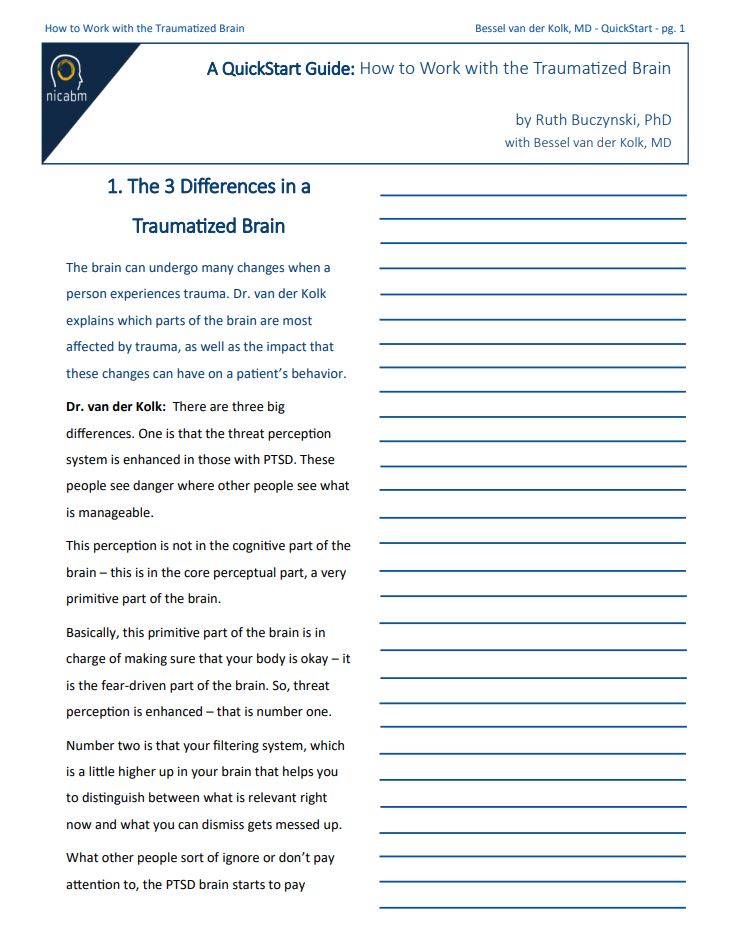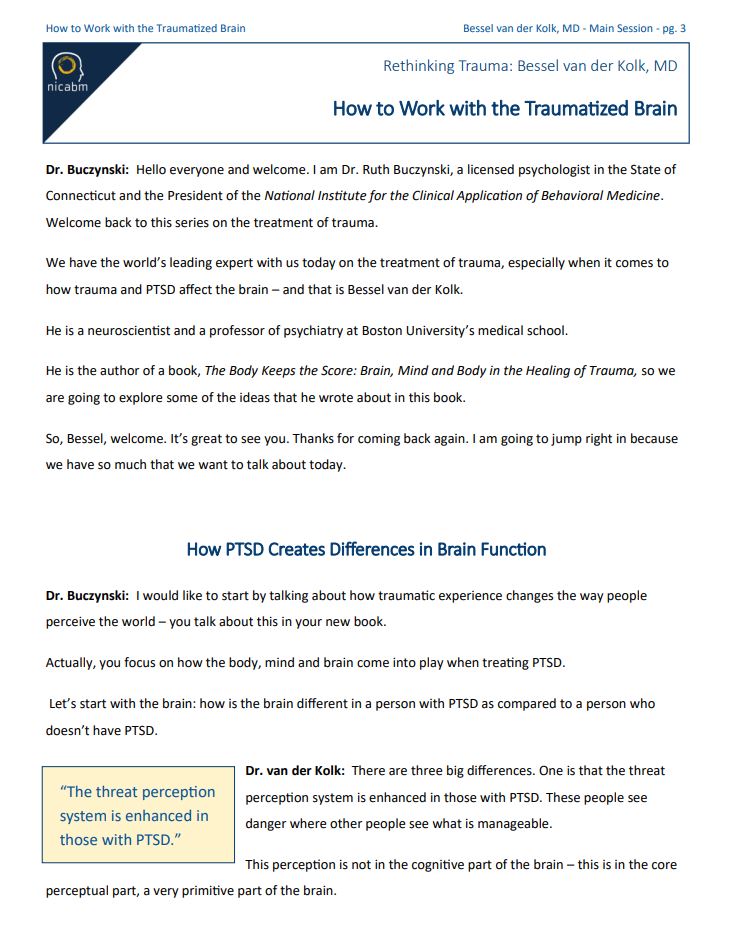Rethinking Trauma: The Right Interventions Can Make Trauma Treatment Faster and More Effective
Rethinking the treatment of trauma
In just this past year alone, experts have discovered new methods for working with trauma’s pernicious symptoms. Their work alone and collectively has provided us with so much more than we knew . . .
. . . only a year ago.
Even as recently as five years ago, we didn’t understand that the lower brain could command the shutdown response, totally bypassing the prefrontal cortex, totally bypassing any sense of “choice.” And we didn’t understand how important the role of neuroception was to the process of feeling safe.
Or how we might calm the fear in a traumatized brain using neurofeedback.
Your patients’ nervous system may be making decisions without their “permission.”
But now we have many more options to help our patients. Especially when we use what we now know about how trauma impacts the nervous system and the brain.
With the right adjustments, techniques that once fell flat can be honed to work more effectively with the symptoms of unresolved trauma.
Understanding the brain’s role can bring depth and power to our interventions.
It allows us to resource our patients with skills to stabilize, ground, and short-circuit old patterns of reactivity. Then we’re better able to clear a way for the deeper work of healing.
Using what we are now learning can help our patients experience fewer symptoms, get better sleep, become more self-reflective and feel more confident.
It all begins in the body – especially the brain.
There’s nothing like the confidence, energy, and deep satisfaction of seeing clients make progress.
Imagine your client pausing in a moment of reactivity and calling on the repertoire of skills you taught them for self-soothing, developing greater stability and resilience – not just in your office, but during the rest of their week as well.
Imagine them feeling safe, with a sense of agency and even self-esteem.
When our interventions succeed, it’s a huge boost to confidence – not just for us, but for our clients, too.
As a practitioner, it’s hard to beat the gratification of seeing a client’s life opening back up.
We feel less burnt out and drained, and feel the joy of the profoundly rewarding work we do.
New techniques, like limbic system therapy, neurofeedback, and other brain and body-oriented approaches…
…that include a polyvagal perspective could be the key to providing more targeted treatments to help trauma patients manage dissociation, reactivity, and instability.
That’s why the best practitioners invest in their professional development.
We’ve put together a new webinar series to bring you leading-edge methods for treating trauma straight from the pioneers in the field.
In Rethinking Trauma, we’ll zero in on big picture developments as well as the details of specific techniques that you can take back to your office.
Register Here for Only $397
and get the video, audio, transcript, TalkBack, Next Week
in Your Practice, and QuickStart Guide
Up to 14 CE/CME Credits or Clock Hours are available for purchase at checkout.
Click HERE to get information about CE/CME credits and clock hours as well as speaker disclosures
You Are Protected By
NICABM’s Money-Back Guarantee
We invite you to register for this comprehensive training program without any risk. Unless you are completely satisfied, we will refund your money. Just let us know within 30 days from the date of registration. We are that confident that you will find this information to be more than you expected.
The experts are rethinking the treatment of trauma. Get the latest breakthroughs in this 6-webinar series:

Getting to the Root of Trauma: Why It’s Critical to Understand the Role of Memory in Trauma Therapy
Peter Levine, PhD
Creator of Somatic Experiencing, Director of The Somatic Experiencing Trauma Institute, author of In An Unspoken Voice: How the Body Releases Trauma and Restores Goodness
- Strategies that Can Help Your Clients Build Resilience Against Traumatic Experiences
- How Trauma Cascades from One Generation to the Next
- Working through the Unintended Consequences of Western Bias in Trauma Therapy
- How to Help Trauma Survivors Revisit Memories without Becoming Stuck in Them
- What Animal Reactions (to Trauma) Can Teach Us About Helping Clients Cope with PTSD
- How Different Types of Memory Can Contribute to the Traumatic Experience
- Reliving and Revisiting: A Useful Strategy that Can Help Your Clients Work Through Trauma with More Stability and Presence

How to Work with the Traumatized Brain – Applying the Latest Strategies to Speed Healing and Reduce Symptoms for Even the Most Traumatized Clients
Bessel van der Kolk, MD
Co-author of The Body Keeps the Score: Brain, Mind, and Body in the Healing of Trauma, Medical Director of the Trauma Center at Justice Research Institute, Faculty at Boston University Medical School
- The Three Big Differences Between a Brain with PTSD and One Without (and What This Means for Treatment)
- The Profound Effect Trauma Can Have on Imagination, and How that Can Drastically Impact Patients’ Lives
- The Smoke Detector, the Cook, and the Watch Tower – How to Bring the Three Parts of the Brain that Play the Biggest Roles in Trauma Back Online
- Key Strategies that Can Help Clients Learn to Tolerate Their Sensations and Be Less Reactive
- How Mindfulness Helps Tame the Body’s Trauma Response
- Limbic System Therapy – A Different Approach to Calming Clients So They Can Process Traumatic Memories More Effectively
- How to Use Neurofeedback to Train the Self-Reflective Part of the Brain

Beyond the Brain: Using Polyvagal Theory to Help Patients “Reset” the Nervous System after Trauma
Stephen Porges, PhD
Author of The Polyvagal Theory, Professor at University of Illinois at Chicago
- Connecting Brain to Body: How to Apply Polyvagal Theory to Free Patients from a Victim Mentality
- How to Work with Neuroception, The “Personal Risk Detector” in the Nervous System
- Using Voice, Gestures, and Engagement to Contribute to Feelings of Safety in Trauma Therapy
- When the Ability to Feel Safe Is Impaired: How Trauma Ruptures the Root of Attachment
- Effective Strategies for Working with the Nervous System
- Why Social Engagement is Crucial in Trauma Therapy

Why a Body-Oriented Approach Is Key for Treating Traumatized Patients (and What It Looks Like in Practice)
Pat Ogden, PhD
Author of Trauma and the Body, Founder & Director of The Sensorimotor Psychotherapy Institut
- How to Bring the “Thinking Brain” Back Online Following Trauma
- Helping Patients Develop Flexibility When Their Response Patterns Have Become Dysregulated
- Normalizing the Body’s Reaction to Fear for Patients Who Have Experienced Trauma
- How to Train Yourself to See the Story of the Body
- The Implicit Self: Finding and Working with the Real Storyteller
- 5 Types of Body Movement (and What They Reveal About Procedural Memory)
- Reframing Trauma Therapy: How to Help Clients Discover Resources to Soothe Themselves

The Neurobiology of Trauma Treatment: How Brain Science Can Lead to More Targeted Interventions for Patients Healing from Trauma
Daniel Siegel, MD
Executive Director of the Mindsight Institute, Co-Director of UCLA’s Mindful Awareness Research Center, author of Brainstorm: The Power and Purpose of the Teenage Brain
- How Age Can Affect Trauma’s Impact on the Brain
- Developmental Trauma: Why Neglect May Be Worse Than Abuse for a Child’s Brain
- The Chemical Effects of Trauma on the Brain
- Why Flashbacks Feel Like Present Experience Instead of Past Memory
- How the Links in the Brain Become Broken During Dissociation
- The Three Areas of the Brain Most Impacted by Developmental Trauma
- Epigenetics and the Effect of Trauma Across Generations

The Fear-Driven Brain: How a New Intervention is Changing Trauma Treatment
Sebern Fisher, MA
Psychotherapist, neurofeedback practitioner specializing in attachment issues. Author of Neurofeedback in the Treatment of Developmental Trauma: Calming the Fear-Driven Brain
- Why Neurofeedback Can Be a Game-Changer for Trauma Patients
- How Brain Waves Contribute to Trauma Symptoms
- What Our Patients’ Brain Waves Tell Us About Their Symptoms, and What Their Symptoms Tell Us About Their Brain Waves
- Re-establishing Attachment Through Brain Wave Training
- How to Calm the Fear in a Traumatized Brain
Register Here for Only $397
and get the video, audio, transcript, TalkBack, Next Week
in Your Practice, and QuickStart Guide
Up to 14 CE/CME Credits or Clock Hours are available for purchase at checkout.
Click HERE to get information about CE/CME credits and clock hours as well as speaker disclosures
You Are Protected By
NICABM’s Money-Back Guarantee
We invite you to register for this comprehensive training program without any risk. Unless you are completely satisfied, we will refund your money. Just let us know within 30 days from the date of registration. We are that confident that you will find this information to be more than you expected.
Starting Today, This Program Can Change the Way You Practice

I can immediately apply what I learn . . .
“Living overseas, I have limited access to professional development opportunities. Much of my work here in Kenya is trauma-related and the series allows me to feel I am in touch with up-to-date information presented by world-class practitioners in the field. I can immediately apply what I learn in my practice without having to travel out of the country!”
Alice Blanchard, Psychotherapist
Nairobi, Kenya

. . . awesome results for my clients
“After the trauma series, I recommended the webinars to all the psychologists I train and supervise as it has had a profound effect on the way I practice, with awesome results for my clients.”
Minnie Loubser, Clinical Psychologist
Stellenbosch, Western Cape, South Africa

I benefit, my practice benefits, and most important my clients benefit . . .
“I live in Nova Scotia and have limited travel funds at the university at which I work. The series provided by NICABM gives me the rare opportunity to listen to the leaders in the field. As a result, I learn valuable information that would not otherwise be available to me. I benefit, my practice benefits, and most important my clients benefit from the knowledge and wisdom I gain from the series.”
David Mensink, PhD Counseling Psychology, Psychologist
Halifax, Nova Scotia, Canada
4 innovative learning tools to help you take action immediately and effectively
Synthesize Key Concepts So You Can Use Them Immediately
In the TalkBack Session, Ron Siegel, PsyD, and Ruth Lanius MD, PhD join me to dig more deeply into the key ideas. Our job is to make yours easier by streamlining the information and making sure each point is crystal clear. We’ll clarify critical concepts and break it all down so you can gain confidence in your understanding.
Discover Concrete Practices That Will Work in Your Life (and with Your Patients)
Then, with “next week” in mind, we’ll turn smart ideas into easy-to-use solutions. In Next Week in Your Practice, Joan Borysenko, PhD, and Bill O’Hanlon, LMFT join me to give you specific strategies for helping people who have experienced developmental trauma self regulate. We’ll show you how to translate teaching into practices and exercises that you (or your clients) can use right away.
Uncover Core Ideas and Techniques at-a-Glance So You Have a “Cheat Sheet” When You Need It Most
The QuickStart Guide will help you stay fresh and confident as you turn insights into action. It’s an at-a-glance reference to the most powerful concepts and strategies for working with patients who have experienced trauma. We’ve gathered all the essential tools and methods into a concise, easy-to-use guide so you can quickly review and apply these ideas when you need them most.
Quickly Recall Crucial Details So You Can Apply Them with Confidence
Our Professional Transcript will help you reinforce key ideas so you can integrate them into your life and work. We’ve designed your transcript with an easy-to-use table of contents, clear, organized formatting, and helpful highlight quotes so you’ll have the information and exercises you need at your fingertips.
With these tools, you’ll be more prepared than ever to work with survivors of trauma.
Register Here for Only $397
and get the video, audio, transcript, TalkBack, Next Week
in Your Practice, and QuickStart Guide
Up to 14 CE/CME Credits or Clock Hours are available for purchase at checkout.
Click HERE to get information about CE/CME credits and clock hours as well as speaker disclosures
You Are Protected By
NICABM’s Money-Back Guarantee
We invite you to register for this comprehensive training program without any risk. Unless you are completely satisfied, we will refund your money. Just let us know within 30 days from the date of registration. We are that confident that you will find this information to be more than you expected.
We know what it takes for practitioners to succeed. We’ve had countless practitioners improve their skills and deliver results with their patients.
What separates successful practitioners from the rest? They:
Put effort into continually learning
Choose to build new skills and gain confidence
Choose the experts at the forefront to study
Tune in and update their skills on a regular basis

We pride ourselves on
delivering high-quality trainings.

I do really like the talkback as a way to wind down and 'land.'
“The NICABM Trauma Series have helped me to feel a closer connection to some of my heroes in the field. It’s nice to be able to bring them into my study, and to feel inspired and re-dedicated through their words. And I do really like the talkback as a way to wind down and ‘land.'”
Harry Zeit, MD, Physician Psychotherapist
Toronto, Ontario, Canada

. . . stimulating in ways I have not experienced in many live seminars
“The content of the webinars and transcripts have been intellectually and professionally stimulating in ways that I have not experienced in many live seminars. I am excited to learn more about the treatment methods recommended by the presenters.”
Karen Fox, PhD, Clinical Psychologist
San Diego, CA

. . . very cost effective and practical . . .
“These programs offer a broad spectrum of both information and specific guidelines with top experts in different fields of addressing human suffering. All in a very cost effective and practical way. Rather than thousands of dollars spent on the cost of conference I can learn in the comfort of my own home or office, on my own schedule. Certainly recommend any of these series to my colleagues.”
Ian Macnaughton, PhD, Psychotherapist
Vancouver, BC, Canada
Here's How It Works
We take pride in delivering high-quality, valuable training programs. Each session is packed with critical information so that by the end, you will have a deeper understanding of how to apply the latest changes in the treatment of trauma to your work.
With a Gold Membership, you get the complete series plus our unique learning tools.

With a Gold Subscription You’ll Get:
|
|
Downloadable videos and audios to watch or listen to when it’s convenient for you |
|
|
TalkBack Segments to distill key ideas (this is where we “land” the session) |
|
|
Next Week in Your Practice sessions to give you concrete strategies to use with patients |
|
|
Printable QuickStart Guides to make review and action simpler than ever |
|
|
Professionally-formatted transcripts of the sessions |
|
|
Audios and transcripts of the bonus sessions |
With the Gold Membership, you’ll get this complete package – all of the videos, audios, transcripts, and learning tools are yours to keep permanently in your professional library.
If you can, please sign up for a Gold Membership. It supports this program and furthers our mission to make innovative mind-body programs available to practitioners throughout the world.
Register Here for Only $397
and get the video, audio, transcript, TalkBack, Next Week
in Your Practice, and QuickStart Guide
Up to 14 CE/CME Credits or Clock Hours are available for purchase at checkout.
Click HERE to get information about CE/CME credits and clock hours as well as speaker disclosures
You Are Protected By
NICABM’s Money-Back Guarantee
We invite you to register for this comprehensive training program without any risk. Unless you are completely satisfied, we will refund your money. Just let us know within 30 days from the date of registration. We are that confident that you will find this information to be more than you expected.
4 Bonuses you’ll get with a
Gold Membership

How Neuroscience Can Give Us a Clearer Picture of Trauma Treatment: Working with the Effects of Early Life Trauma and PTSD on the Brain
Ruth Lanius MD, PhD
Co-Editor of The Impact of Early Life Trauma on Health and Disease, Faculty at University of Western Ontario
- Integrating a Sense of Time, Thought, Body, and Emotion into Therapeutic Interventions
- How to Adapt a Body Scan for a Traumatized Client to Uncover What’s Going On in the Body
- Helping Traumatized Patients Get Beyond Alexithymia (the Inability to Put Their Feelings into Words) and Express Their True Emotions
- How to Help Clients Emerge from Shutdown So They Can Feel a Wide Range of Emotions
- Empowering the Non-Dissociative Patient to Find Healing Words for Their Narrative

How to Help Trauma Patients Establish a Sense of Safety and Repair Attachment Using EMDR
Laurel Parnell, PhD
Author of Attachment-Focused EMDR: Healing Relational Trauma
- How EMDR Works to Stimulate Both Hemispheres of the Brain (and Why That Can Be So Effective for Helping Your Client Reach Adaptive Resolution)
- The 5 Principles for Repairing Attachment using EMDR
- How EMDR Can Kickstart the Natural Healing System
- Why Validating Your Client’s Experience Can Get Them Past Roadblocks
- Why Loving-Kindness and Mindfulness Meditation Are Important in Attachment Repair

Working with a Client’s Inner Systems to Heal Trauma and Develop Greater Calm and Compassion
Richard Schwartz, PhD
Author of You Are the One You’ve Been Waiting For
- How to Interview and Disarm Your Client’s Inner Critic and Create Space for Healing
- Empowering a Traumatized Client to Be Their Own Primary Caretaker so They Can Create Harmony with Loved Ones and Themselves
- How to Help Clients Develop an “Inner Leader” and Respond to Destructive Parts of Their Inner Life with Greater Mindfulness and Compassion
- The 8 C’s of Self-Leadership (And How They Can Be Used to Help Patients Heal)
- Why the Most Playful, Carefree, Loving, Trusting, and Creative Parts of Us Are Most Vulnerable to Trauma’s Impact
- Your Clients’ Roadblocks to Inner Listening and How to Overcome Them

Brainspotting: An Evolving, Healing Science for Trauma Therapy
David Grand, PhD
Author of Brainspotting The Revolutionary New Therapy for Rapid and Effective Change
- “Where We Look Affects How We Feel”: Using the Patient’s Visual Field as a Window into Their Unprocessed Trauma
- The Dual-Orientation Process of Trauma Therapy: Working with Both Internal and External Environments
- Eye Fixation and Eye Focus: How Creatively Modifying EMDR Led to the Discovery of Brainspotting
- How to Work with the Quieter, Deeper Somatic Practice of Focusing on a Single Spot
- Using the Brain-Body “Code Word” for Trauma Patients Who Can’t Articulate What They’re Feeling
- 5 Types of Body Movement (and What They Reveal About Procedural Memory)
- Brainspotting as a Focused Mindfulness-Based Approach to Trauma Therapy
Your colleagues are already benefiting from our programs.

. . . instrumental in opening my mind and heart to understanding trauma.
“These seminars have been instrumental in opening my mind and heart to understanding trauma. They are brief and accessible and of such high quality that I’ve been able to glean real understanding and a starting point for further study. I can’t say enough about them. I have recommended them to so many of my colleagues and they say the same things I do about them. Thank you Ruth!”
Angela Lawrence, Drug and Alcohol Counselor
British Columbia, Canada

The material covered has . . . fully supported my purpose, enhancing my knowledge of the theories behind the actions taken.
“I am a soldier, who works with other soldiers and their families (The PTSD Retreat), in reference to PTSD. We, as soldiers, are all taught the very basics of PTSD, in what we call “death-by-PowerPoint,” but it never goes beyond this. Indeed, it is repeated over and over, without change, and it rarely if ever gets to the families. The material covered in here has fully supported my purpose, enhancing my knowledge of the theories behind the actions taken. I am so grateful to have been able to follow this series and look forward to furthering my education with this entity. Thank you”
D. Nicole Johnson, Drug and Alcohol Counselor
Starr Founder, The PTSD Retreat

My clients have been able to build their confidence. . .
“My clients have been able to build their confidence in their ability to self-regulate on their own in pretty difficult situations, including work and family of origin situations. Their success has then built their self-esteem as they can see that they can be successful in changing some fairly habitual ways of interacting and hurting themselves. It is a positive cycle that builds upon itself”
Nancy Lasater, MSW, LCSW
Boulder, CO
Get quickly onboard with the most effective trauma treatments from the last year.
The Rethinking Trauma webinar series draws from among the world’s most effective practitioners. We get into top-level lessons in every session.
With our unique suite of learning tools, you’ll be equipped to implement the concepts, exercises, and applications immediately.

The webinars are candid, comprehensive, and profoundly useful.

Power-packed webinars
with prominent leaders
in the field
Hands-on examples of
how you can bring greater
healing to your clients

Why the Transcripts Are Essential:
- The transcript makes it easy to go back and double check concepts, citations and names that are mentioned
- We put in a table of contents to make it easy for you to find the exact part of the webinar you need
- Having the concepts already written allows you to take notes on how you’re going to use the ideas rather than transcribing the ideas
- Some people simply learn better by reading than by listening or watching
- You will be able to print out and share techniques presented in the session with your patients

“I really liked being able to follow along with the transcripts as I listened…it was nice not to feel like I had to take notes. I really feel like I remember more when I both hear and see at the same time.”
Mary Ellen McNaughton, Masters in Counseling, Psychology Counselor
Kelowna, British Colombia, Canada
Register Here for Only $397
and get the video, audio, transcript, TalkBack, Next Week
in Your Practice, and QuickStart Guide
Up to 14 CE/CME Credits or Clock Hours are available for purchase at checkout.
Click HERE to get information about CE/CME credits and clock hours as well as speaker disclosures
You Are Protected By
NICABM’s Money-Back Guarantee
We invite you to register for this comprehensive training program without any risk. Unless you are completely satisfied, we will refund your money. Just let us know within 30 days from the date of registration. We are that confident that you will find this information to be more than you expected.
These teachers know how to dig in and turn complex principles into simple, flexible applications.
They’ll share how they use the latest approaches to the treatment of trauma to help their clients change in ways they never expected – and how you can do the same.
Trauma can be devastating, and its impact is far-reaching.
Because of this, we are never satisfied by the status quo. We are passionate about finding the most effective and innovative approaches for getting deeper and more rapid ways to reduce suffering and help clients find their footing once again.

We search out the most creative practitioners who have developed extraordinary methods for getting results.
It doesn’t matter if they are well known or totally unknown. What matters is that they have an exceptional approach that is a cut above the rest.

And when we find them, we home in on exactly what it is they are doing that makes such a remarkable difference so that we can teach other practitioners how to get the same results with their patients.
If you are the kind of practitioner who also has a burning desire to find the best ways to help clients, who will go way beyond expectations to be the best that you can possibly be, come join us as we identify what it is that makes these innovative thinkers so successful in their work.
You Are Protected By
NICABM’s Money-Back Guarantee
We invite you to register for this comprehensive training program without any risk. Unless you are completely satisfied, we will refund your money. Just let us know within 30 days from the date of registration. We are that confident that you will find this information to be more than you expected.
Register Here for Only $397
and get the video, audio, transcript, TalkBack, Next Week
in Your Practice, and QuickStart Guide
Up to 14 CE/CME Credits or Clock Hours are available for purchase at checkout.
Click HERE to get information about CE/CME credits and clock hours as well as speaker disclosures

